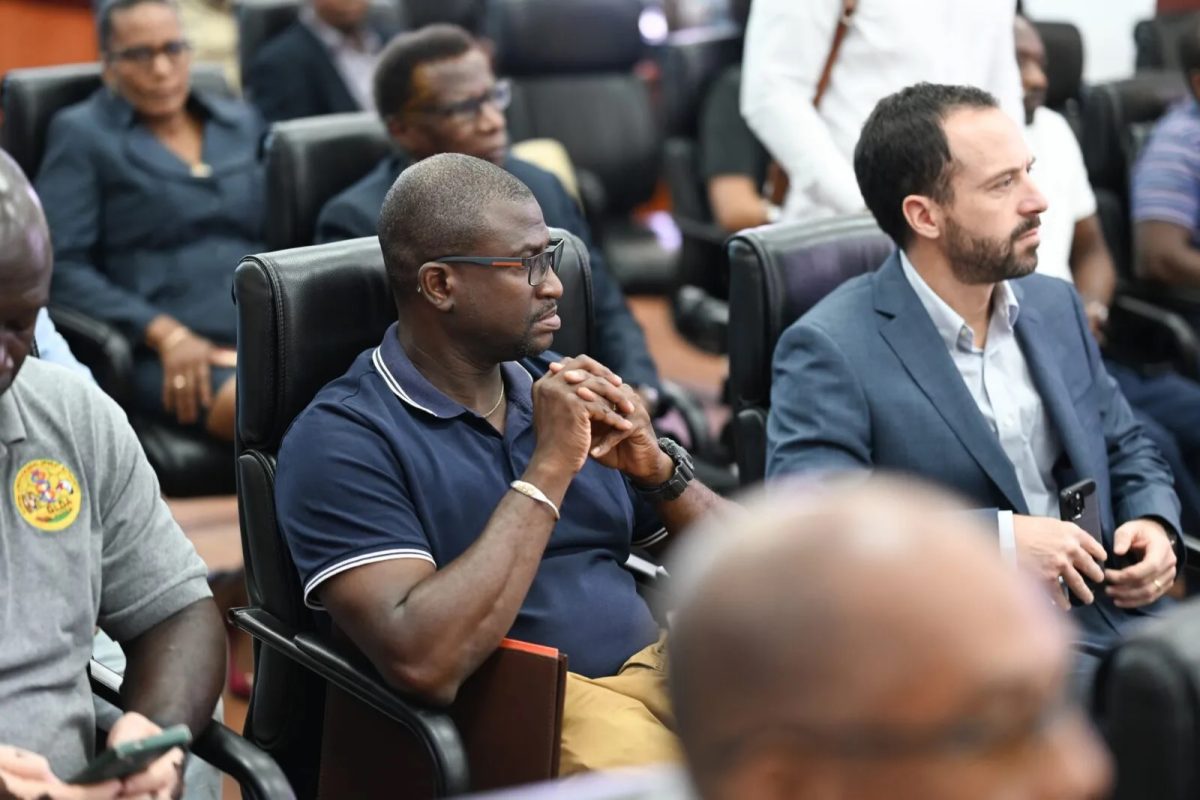A private sector-led CARICOM agriculture insurance programme was yesterday launched in Georgetown – the culmination of years of discussions on how to help farmers protect their investments.
Guyana’s President Irfaan Ali emphasized the importance of supporting insurance to meet the financial needs of farmers and the necessity of making decisions based on data-driven, technology-based research to ensure optimal utilization of land and water resources
The Regional Economic Agri-lnsurance Programme (REAP) was launched in collaboration with the Ministry of Agriculture and nine other member nations of CARICOM. It was held at the Arthur Chung Conference Centre.
The Department of Public Information reported that Lynch Caribbean Brokers in partnership with GuyCarpentar and Raincoat worked together to develop the Caribbean insurance product. DPI said that the insurance product caters to crop farmers, livestock farmers and fisherfolk.
Followed by applause, Ali reflected on a commitment made three years ago when his administration pledged to work with banks to create support facilities for farmers. At that time, the private sector lacked major projects and business plans ready for financing. Fast forward to today, and the landscape has dramatically shifted. The grain sector has seen considerable advancement, with heightened competition in grain production, he said. The government has played a crucial role here by providing essential infrastructure, resulting in savings of tens of millions of US dollars on import costs, he said. Moreover, the administration has strategically integrated backward into feed production and forward into regional poultry support. Looking ahead, plans are in place to establish a new feed mill for aquaculture in the Caribbean region, he stated.
Joseph Cox, CARICOM Assistant Secretary-General for Economic Integration, Innovation, and Development, celebrated the milestone as a pivotal moment for regional development. The REAP initiative represents a major outcome of the Special Ministerial Taskforce on Food Production and Food Security, designed to enhance the resilience of the agricultural sector through the provision of targeted insurance for farmers across the CARICOM region.
Cox expressed enthusiasm at the launch, emphasizing the collaborative efforts that have brought the programme to fruition. “I am thrilled to be part of this inaugural event, which marks the beginning of a significant private sector-driven agriculture insurance initiative for our Region. I commend Barbados, Dominica, Guyana, Saint Kitts and Nevis, Saint Lucia, and Saint Vincent and the Grenadines for leading the way in this initial phase,” he said.
Vulnerability
The programme is a key component of the 25% by 2025 Initiative, aimed at addressing the vulnerability of CARICOM member states to the impacts of climate change. Agriculture in the Caribbean, heavily dependent on stable weather patterns, faces increasing threats from extreme weather events. The recent devastation caused by Hurricane Beryl, and the catastrophic impact of Hurricane Maria on Dominica— where the nation saw a loss equivalent to 290% of its GDP—underscores the urgent need for robust recovery and resilience strategies.
Agricultural insurance is poised to play a crucial role in this context, offering protection against the unpredictable effects of climate change. As weather-related events become more frequent and severe, such insurance is vital for safeguarding farmers’ livelihoods and ensuring regional food security. The Food and Agriculture Organization’s recent report highlighted the severe financial losses suffered by developing countries due to natural disasters affecting crop and livestock production.
The REAP initiative aims to enhance food sovereignty and economic resilience by promoting sustainable and resilient agricultural practices. By enabling farmers to better manage climate-related risks and recover swiftly from natural disasters, agriculture insurance supports the Region’s broader goals of food security and economic stability.
Cox also highlighted the broader benefits of the REAP programme, noting that it could stimulate private sector involvement and cross-border investments.
“Agriculture insurance not only mitigates risks but also encourages investment, fosters innovation, and supports growth within the sector,” he explained.
The Secretariat remains committed to supporting the REAP initiative and wishes it success in its implementation, Cox said. As the region continues to address challenges to food and nutrition security, Cox affirmed that REAP is a significant achievement and a step forward in creating a more investor-friendly environment for regional food and nutrition security.
“This is indeed a substantial effort and a significant advancement for agriculture and regional food security,” Cox added. “The success of the REAP programme will act as a catalyst in de-risking the agriculture sector and fostering a more resilient and investment-friendly ecosystem”, he declared.





